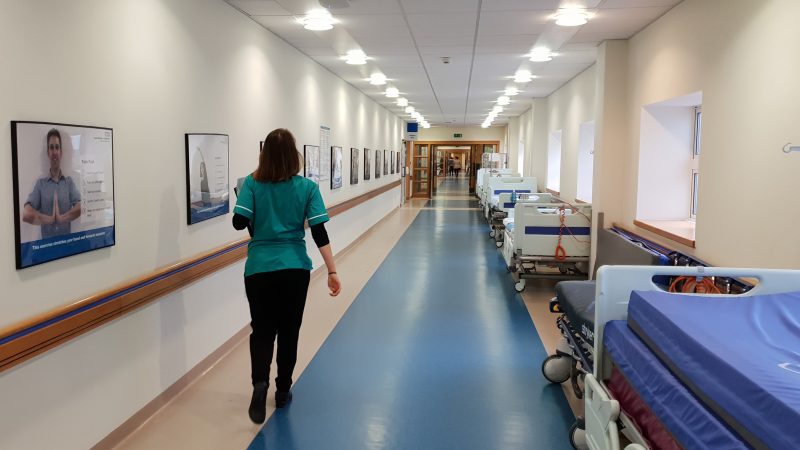
Royal College of Nursing members have voted to reject a pay deal from the government, after UNISON members in the NHS voted in favour of the offer – with the nursing union announcing a further 48-hour walkout later this month.
The RCN revealed this evening that its members have voted to reject the government’s deal, with 54% voting against the offer on a 61% turnout. UNISON announced earlier today that its members had voted to accept, with almost three-quarters voting in favour of the deal on a turnout of 53%.
The government’s pay deal includes a one-off payment of 2% of members’ salaries plus a Covid recovery bonus of 4% for the financial year 2022/23, along with a 5% pay increase for 2023/24.
The RCN announced that its members will take part in a 48-hour strike from 8pm on April 30th until 8pm on May 2nd. It said staff working in emergency departments, intensive care units, cancer care and other services will be involved in strike action for the first time.
Following the ballot result, RCN general secretary Pat Cullen urged Health Secretary Steve Barclay to open direct negotiations with her. She said: “What has been offered to date is simply not enough. The government needs to increase what has already been offered, and we will be highly critical of any move to reduce it.”
Cullen added: “Until there is a significantly improved offer, we are forced back to the picket line. Meetings alone are not sufficient to prevent strike action, and I will require an improved offer as soon as possible.”
A government spokesperson said it was “hugely disappointing” that RCN members had rejected the deal, saying: “Following constructive discussions, all parties agreed this was a fair and generous offer which is demonstrated by UNISON, representing the largest share of the NHS workforce, choosing to accept it.
“The fact that the Royal College of Nursing has announced an escalation in strike action with no derogations, based on a vote from the minority of the nursing workforce, will be hugely concerning for patients.”
UNISON revealed that 74% of those who took part in its ballot voted to accept the government’s offer, while 26% voted to reject the deal. A total of 152,329 votes were cast out of a possible 288,000, meaning turnout was 53%.
UNISON head of health Sara Gorton said: “Clearly, health workers would have wanted more, but this was the best that could be achieved through negotiation. Over the past few weeks, health workers have weighed up what’s on offer. They’ve opted for the certainty of getting the extra cash in their pockets soon.”
Gorton added: “Other unions are still consulting, so the full picture won’t emerge until the end of the month. UNISON will be urging the government to ensure NHS workers get the wage rises they’ve voted for at the earliest opportunity.
“This vote might end UNISON’s dispute, but it doesn’t solve the wider staffing emergency affecting every part of the NHS. Now, the government must work with unions to bring about a sustained programme of investment in the workforce.”
Health unions including UNISON, Unite, the RCN and the GMB reached the pay deal with the government in March, which both sides described as “fair and reasonable” in a joint statement. Industrial action was paused while the unions consulted their members on the deal.
Unions including the RCN, UNISON and the GMB recommended that members accept the new offer. Unite, however, said it could not recommend the deal but added that members would have the final decision. Members of Unite and GMB have two further weeks to consider the deal, with their ballots closing on April 28th.
Tens of thousands of nurses have taken part in multiple days of strike action in recent months – the first strikes in the RCN’s history. The union announced in February that it was pausing industrial action following an offer of “a process of intensive talks” with the government.
Ambulance workers represented by UNISON, the GMB and Unite have also staged multiple walkouts. A planned strike by UNISON members working in other parts of the health service was suspended in March to allow the union to enter pay talks with the government.
The next stages of the pay negotiation process following the RCN’s decision to reject the deal remain uncertain. According to Politico, the NHS staff council – which oversees pay for nurses and other NHS workers covered by the Agenda for Change system – is due to meet on May 2nd to decide on the pay offer.
A senior official with knowledge of the process told the news outlet that each member of the council gets a weighted vote based on the size of their membership, with the deal only needing a simple majority to pass, meaning it could possibly be implemented without every member of the council being in favour.
The new offer does not cover doctors, who are on a different contract. Junior doctors are taking part in their fourth successive day of strike action today, following a previous 72-hour walkout in March.
Junior doctors represented by the British Medical Association (BMA) are calling for full pay restoration, following what they say has been a 26% real-terms cut in their pay since 2008/9.
The government argues that this would amount to a 35% pay rise and has said staff must “significantly reduce” their demand and pause strike action before formal negotiations can commence.
This is a breaking story and will continue to be updated.




More from LabourList
LabourList readers reveal their highs and lows of Labour’s first year
Left candidate loses council leadership race after national party ordered re-run
Richard Burgon: ‘Labour MPs must reject massive cut still in disability bill’